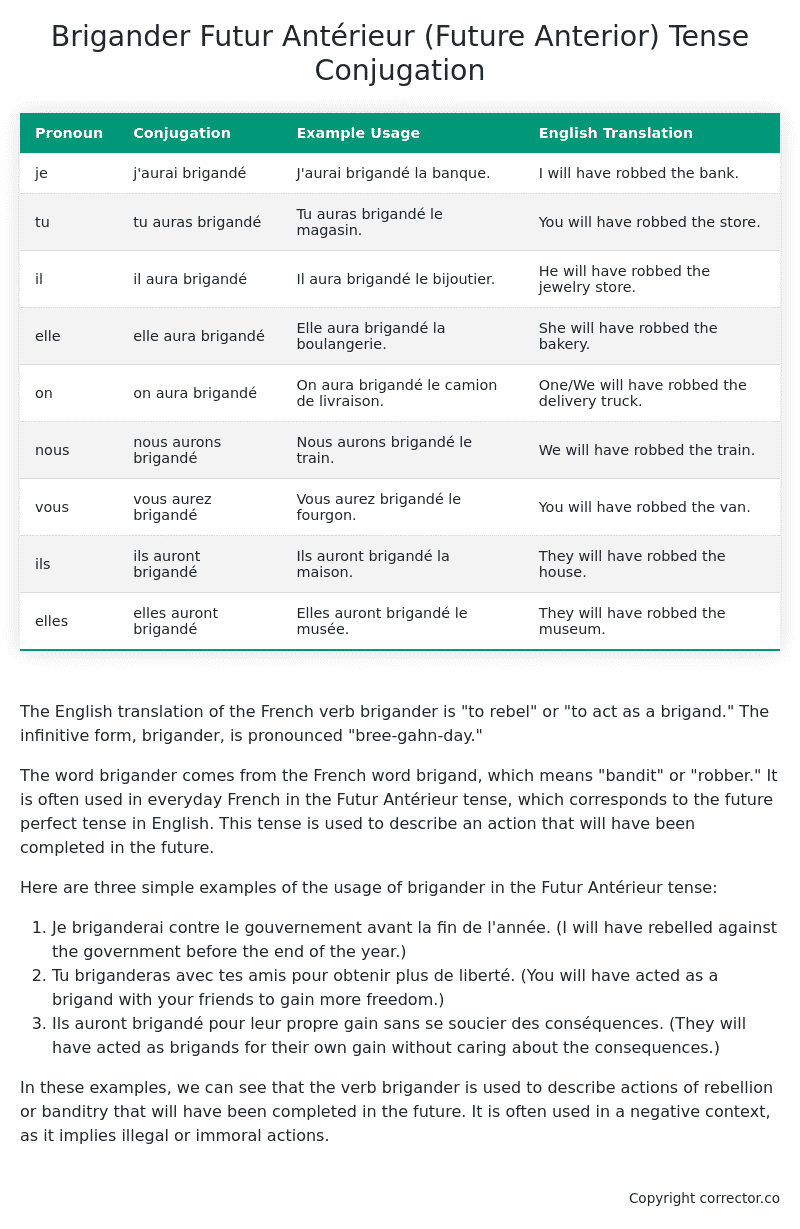Futur Antérieur (Future Anterior) Tense Conjugation of the French Verb brigander
Introduction to the verb brigander
The English translation of the French verb brigander is “to rebel” or “to act as a brigand.” The infinitive form, brigander, is pronounced “bree-gahn-day.”
The word brigander comes from the French word brigand, which means “bandit” or “robber.” It is often used in everyday French in the Futur Antérieur tense, which corresponds to the future perfect tense in English. This tense is used to describe an action that will have been completed in the future.
Here are three simple examples of the usage of brigander in the Futur Antérieur tense:
- Je briganderai contre le gouvernement avant la fin de l’année. (I will have rebelled against the government before the end of the year.)
- Tu briganderas avec tes amis pour obtenir plus de liberté. (You will have acted as a brigand with your friends to gain more freedom.)
- Ils auront brigandé pour leur propre gain sans se soucier des conséquences. (They will have acted as brigands for their own gain without caring about the consequences.)
In these examples, we can see that the verb brigander is used to describe actions of rebellion or banditry that will have been completed in the future. It is often used in a negative context, as it implies illegal or immoral actions.
Table of the Futur Antérieur (Future Anterior) Tense Conjugation of brigander
| Pronoun | Conjugation | Example Usage | English Translation |
|---|---|---|---|
| je | j’aurai brigandé | J’aurai brigandé la banque. | I will have robbed the bank. |
| tu | tu auras brigandé | Tu auras brigandé le magasin. | You will have robbed the store. |
| il | il aura brigandé | Il aura brigandé le bijoutier. | He will have robbed the jewelry store. |
| elle | elle aura brigandé | Elle aura brigandé la boulangerie. | She will have robbed the bakery. |
| on | on aura brigandé | On aura brigandé le camion de livraison. | One/We will have robbed the delivery truck. |
| nous | nous aurons brigandé | Nous aurons brigandé le train. | We will have robbed the train. |
| vous | vous aurez brigandé | Vous aurez brigandé le fourgon. | You will have robbed the van. |
| ils | ils auront brigandé | Ils auront brigandé la maison. | They will have robbed the house. |
| elles | elles auront brigandé | Elles auront brigandé le musée. | They will have robbed the museum. |
Other Conjugations for Brigander.
Le Present (Present Tense) Conjugation of the French Verb brigander
Imparfait (Imperfect) Tense Conjugation of the French Verb brigander
Passé Simple (Simple Past) Tense Conjugation of the French Verb brigander
Passé Composé (Present Perfect) Tense Conjugation of the French Verb brigander
Futur Simple (Simple Future) Tense Conjugation of the French Verb brigander
Futur Proche (Near Future) Tense Conjugation of the French Verb brigander
Plus-que-parfait (Pluperfect) Tense Conjugation of the French Verb brigander
Passé Antérieur (Past Anterior) Tense Conjugation of the French Verb brigander
Futur Antérieur (Future Anterior) Tense Conjugation of the French Verb brigander (this article)
Subjonctif Présent (Subjunctive Present) Tense Conjugation of the French Verb brigander
Subjonctif Passé (Subjunctive Past) Tense Conjugation of the French Verb brigander
Subjonctif Imparfait (Subjunctive Imperfect) Tense Conjugation of the French Verb brigander
Subjonctif Plus-que-parfait (Subjunctive Pluperfect) Tense Conjugation of the French Verb brigander
Conditionnel Présent (Conditional Present) Tense Conjugation of the French Verb brigander
Conditionnel Passé (Conditional Past) Tense Conjugation of the French Verb brigander
L’impératif Présent (Imperative Present) Tense Conjugation of the French Verb brigander
L’infinitif Présent (Infinitive Present) Tense Conjugation of the French Verb brigander
Struggling with French verbs or the language in general? Why not use our free French Grammar Checker – no registration required!
Get a FREE Download Study Sheet of this Conjugation 🔥
Simply right click the image below, click “save image” and get your free reference for the brigander Futur Antérieur tense conjugation!

Brigander – About the French Futur Antérieur (Future Anterior) Tense
Construction
Common Everyday Usage Patterns
Interactions with Other Tenses
For example
Summary
I hope you enjoyed this article on the verb brigander. Still in a learning mood? Check out another TOTALLY random French verb conjugation!


